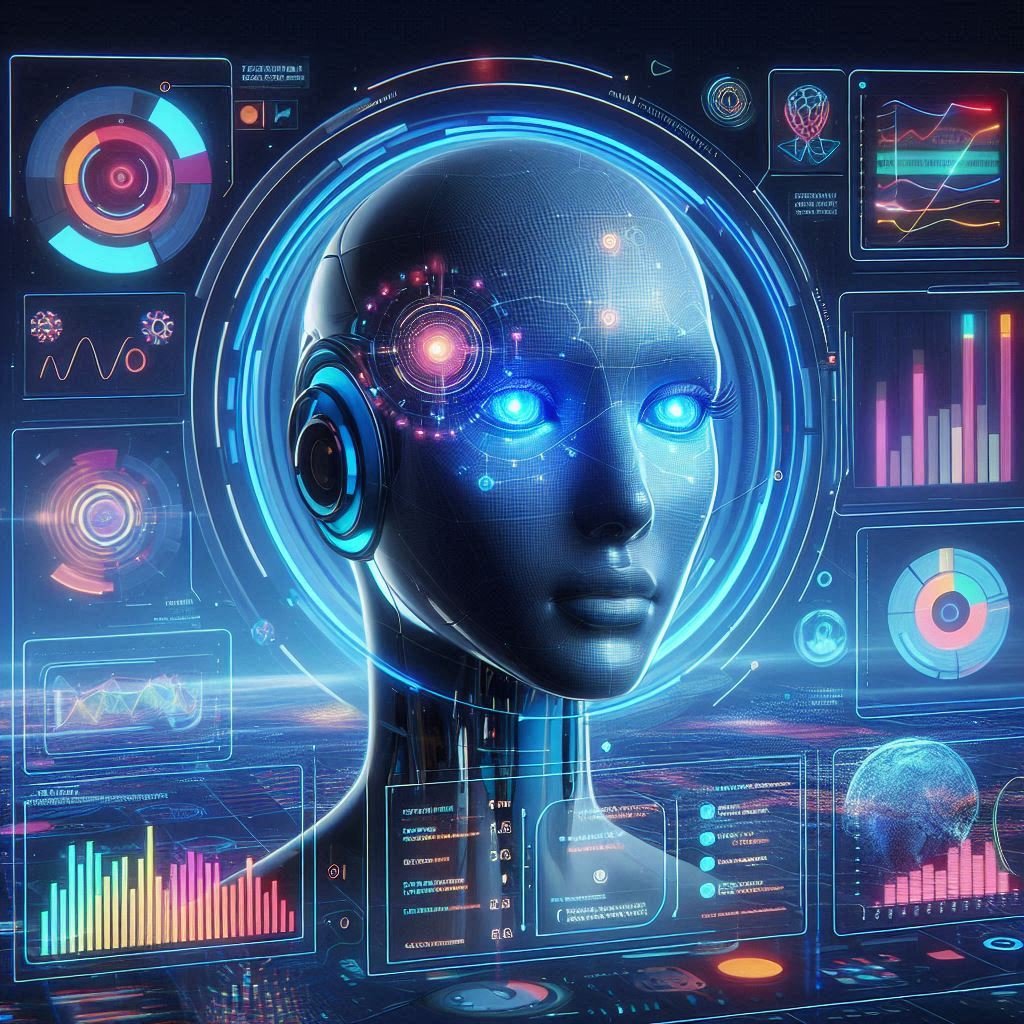Introduction
Artificial intelligence has been one of the digital game-changers in marketing; it has offered capabilities that in the past had no parallel in terms of efficiency, accuracy, and effectiveness. Moving forth to 2024, more than ever, the adoption of AI tools becomes imperative for someone who is a digital marketer and wants to stay competitive. The article is going to expound on top AI tools which digital marketers should consider integrating into their strategies if they are going to revolutionize the approach towards attainment of remarkable results.
What is an AI Tool:
AI tools do a variety of tasks that involve machine learning algorithms and data analysis to do work requiring human intelligence on one end. They study huge amounts of data to identify patterns in it and predict them in order to optimize various areas of digital marketing. AI tools, in comparison to the conventional tools for marketing, come with advanced features involving real-time data analysis, predictive modeling, and automation.
Top AI Tools for Digital Marketers in 2024

AI Analytics Tools
The support system of tracking, analyzing, and measuring in marketing performance would be the AI analytics tools. Valuable information concerning website traffic, user behavior, and campaign effectiveness is supplied by these tools.
Example Tools:
Google Analytics 4: Google Analytics 4 offers the most advanced features, machine learning-based insights, cross-platform tracking, and enhanced data privacy controls.
HubSpot Analytics: These analytics are detailed in marketing campaigns, customer behavior, and sales performance.
Kissmetrics: For user behavior analytics, it informs marketers how their visitors use websites.
These can drive actions based on data, facilitating optimization and improvement of results.
AI-Driven Content Creation Tools
Terrific content can capture people’s interest and drive eyeballs to a website all by itself. AI-powered tools take a lot of the drudgery out of developing quality content quickly and affordably.
Example Tools:
Jasper uses AI to generate original, creative blog and social content.
Copy.ai: It helps generate marketing copies, product descriptions, and social media posts.
Writesonic: It generates SEO-friendly content, ad copy, and product descriptions.
These tools will help you save a little time and resources by ensuring that the content is engaging, relevant, and search engine-optimized.
Artificial Intelligence-Based Social Media Management Tools
Social media campaigns management is one time-consuming task. Artificial Intelligence-based social media management tools can automate from scheduling a post to one as complex as analyzing engagement metrics.
Example Tools:
Hootsuite: Uses AI for social media scheduling, content curation, and performance analytics.
Buffer: Use AI to schedule, publish, and analyze social media posts.
Sprout Social: Get access to insights on audience engagement and social media effectiveness using AI.
How these tools will help the marketers in organizing their social media efforts, fostering engagement, and growing online presence.
AI-Powered SEO Tools
SEO continues to be an integral component of digital marketing. AI-powered SEO tools can help to optimize websites, find the right keywords, and even analyze competitors.
Example Tools:
Ahrefs: All tools for keyword research, backlink analysis, and content optimization under one roof.
SEMrush: AI-powered insight on SEO, PPC, Content Marketing, and Competitive Research. Leading among sophisticated SEO tools is Moz Pro: it utilizes Artificial Intelligence in site audits, track rankings, and research on keywords to allow marketers to get better rankings in search engines and grow more organic traffic.
AI in Email Marketing:
One very impressive way of contacting customers is email marketing. AI tools can assist by optimizing email campaigns to make them personal, timely, and effective.
A few example tools include :
Mailchimp: it leverages AI to optimize email campaigns by offering personalized content recommendations and automated workflows.
Sendinblue: it provides AI-driven email campaign management, segmentation, and analytics.
ActiveCampaign: AI-driven email automation, predictive sending, and customer journey mapping. Marketers can use the above tools to offer the right email campaigns that make sense for customers to drive conversions and establish customer loyalty.
AI-Powered CRM Tools
For the CRM to work efficiently, customer relationships need to be administered. AI-powered CRM tools provide advanced functionality in predictive analytics and personalized communication.
Example Tools:
Salesforce Einstein: AI is available to help with item behaviors, sales forecasts, and personal recommendations for contacts.
Zoho CRM: AI-driven leads scoring, sales automation, and customer insight.
HubSpot CRM: AI combined with tools for contact management, lead nurturing, and sales analytics.
These help improve and increase customer relationships and help increase the rate of customer satisfaction in general.
AI in Advertising and PPC Campaigns
AI may be used in the optimization of advertising campaigns to target the relevant audience for maximum ROI-based campaigns.
Example Tools:
Google Ads – Run Ads using AI, which optimizes ad targeting, bidding, and performance analysis. Second, Facebook Ads Manager provides AI-driven functionalities for creating, targeting, and tracking ad performance. AdRoll – AI-powered ad campaigns retarget potential customers for that extra ad spend across platforms. Simply put, they are tools that reduce “wasteful” ad spends from marketers while optimizing for better results.
How to Incorporate AI Tools into Your Digital Marketing Strategy?

Choosing the Right AI Tools, When using AI tools in your marketing, consider what exactly you need, the budget, and the features in different tools. Study the user reviews, and ask for recommendations. Take away those that resonate with your marketing goals.
Integration of AI Tools with Current Marketing Platforms
By making sure your AI tools seamlessly integrate with your existing marketing platforms, you want to ensure one single cohesive marketing tech stack is compatible and synchronized with the data from each tool.
Training Your Team on AI Tools
Effective use of AI tools requires investment in training and upskilling your marketing team. Help your team through resources, courses, and certifications to be a master of these tools and help them keep updating themselves with changing trends.
Observe key metrics that measure the effectiveness of AI tools in your marketing strategy. Track ROI and performance improvements with analytics, and make changes accordingly to get maximum ROI results.
Best AI Tools for Automation 2024
Workflow automation tools are those intelligence-powered tools that automate business processes via repetition, thus saving time. Such tools help with productivity and perfection in effectively finishing tasks.
Inside Zapier: It does, through this, make it possible for the various apps to live inside a single platform, thus automating workflows and, therefore, transferring data to be able to automate a number of tasks. Automate.io: The platform provides a very easy way of integrating and automating tasks between different apps and services. Workato: Powerful workflow automation with enterprise-level features to facilitate demanding automation. These tools enable businesses to automate workflows, reduce manual work, and improve overall efficiency.
AI-driven Marketing Automation Tools
The marketing automation tools have AI built in to optimize marketing campaigns, customer engagement, and return on investment. This makes way for many of the activities to be done by itself, including email marketing, lead nurturing, and customer segmentation.
Example Tools
HubSpot: Develops AI-powered marketing automation features, including email marketing, social media management, and lead scoring.
Market: Offers in-depth marketing automation, campaign management, and analytics of all marketing activities.
Pardot: B2B marketing automation that uses AI-based features to organize lead management and automate email marketing.
These tools automate repetitive tasks in the working schedule; personalize consumer interaction; and support the performance analysis of campaigns.
AI-based Customer Service Automation Tools
These are the AI technology tools that implement techniques to enhance the effectiveness of serving customers and their satisfaction in return. Some examples include chatbots, automated responses, and sentiment analysis.
Example Tools:
Drift—AI-powered chatbots for customer engagement, answering questions, and arranging meetings.
Intercom—Automation of support through AI messaging calls for better customer engagement and support.
Zendesk—It has created tools where AI powers customer support automation, such as chatbots and automated ticketing systems.
These help organizations respond faster and more accurately to customer inquiries, thus increasing customer satisfaction overall.
AI in Financial Automation
In-built financial automation tools use artificial intelligence in making financial activities smoother, which can be in the form of even generating invoices, tracking expenses, and even forecasting the financials. Such tools are far more accurate, less resource-draining, and impart real-time insight into financial operation.
Example Tools
Xero: Offers AI-guided, automated invoicing, and expense management and financial reports
QuickBooks: AI tools for book-keeping, invoicing, and financial analysis
Expensify: Driven by AI, it automates such functions as expense reporting and approvals.
AI-powered Sales Automation Tools
The sales automation tools use artificial intelligence to automate the sales process, improve lead generation, and enhance sales forecasting. They give predictive analysis, lead scoring, and even personalized communication.
Example Tools:
Bpm’online: It is a sales cycle automation software that aligns the sales and marketing processes.
Inside Sales: AI-powered sales acceleration solutions, including predictive lead scoring and engagement analytics. Zoho CRM: Automates business enterprise functions and sales force management, including lead management and sales forecasting. These tools help the sales team focus on high-impact activities oriented to maximize revenue growth through a more robust lead conversion ratio.
Key Technologies Behind AI Automation
AI tool automation is powered by several cutting-edge technologies:
- Machine Learning: Enables systems to learn from data and improve over time without being explicitly programmed.
- Natural Language Processing (NLP): Allows machines to understand and process human language, making interactions more intuitive.
- Computer Vision: Enables machines to interpret and make decisions based on visual data.
- Predictive Analytics: Uses historical data to predict future outcomes, aiding in proactive decision-making.
How AI Tool Automation Works?
Collection of Data and Analysis
The substratum of AI tool automation is data. It begins with the collection of relevant data from several sources, such as databases, sensors, and user interactions. The preprocessed data must be clean and prepared for analysis. AI tools then analyze this data to find patterns, trends, and insights that will be useful in automation processes.
Machine Learning Models
In the second stage, machine learning models are created and trained once the data is prepared. These may be supervised models that learn from the labeled data or unsupervised models that learn patterns from unlabeled data. Next, the models are validated and tested for their accuracy.
AI Algorithms Implementation
The right AI algorithms, based on the tasks to perform and other requirements, are picked out and implemented. These algorithms are integrated into existing systems for the smooth running of operations. Integration is done to ensure that the chosen tools of AI are able to interface with other software and hardware components in the infrastructure of the business.
Real-Time Processing and Decision Making
One of the most important advantages of AI tool automation is real-time data processing. On the other hand, AI tools tend to continuously monitor streams of data and then make an automated decision in accordance with the insights derived. Such real-time processing will help businesses react with pace to the changing conditions and respond to decisions without any loss of time.
AI Tool Automation Applications
Business Process Automation
AI tools are continuously coming up with innovations in business process automation by handling repetitive and time-consuming tasks. For example, AI can automate data entry, invoice processing, and inventory management, leaving workers to deal with higher-order activities.
Marketing Automation
AI-driven marketing automation tools optimize marketing effort by automating email marketing, customer segmentation, and lead scoring. The tools have inbuilt personalization of customer interactions and analysis of campaign performance, hence optimizing marketing strategies.
Customer Support Automation
AI-driven customer support tools, including chatbots and virtual assistants, respond quickly to customers’ queries. These are empowered with NLP to understand the query of a customer and provide an accurate solution, thereby improving customer satisfaction and reducing response time.
Sales Automation
AI tools in the sales domain assist in generating leads, forecasting sales, and managing customers. This helps sell teams to focus on the right leads, which then helps in bringing fruitful results by developing an approach based on analysis of customer information and prediction of sales trends.
Financial Automation
AI tools automate financial tasks of generating invoices, tracking expenses, and generating reports related to finance. They introduce accuracy, speed, and efficiency into the tasks and help businesses handle their financial resources efficiently.
Human Resources Automation
But AI is also changing human resources with the computerization of recruitment, employee management, and performance tracking. AI tools screen the resume, schedule interviews, and analyze employee data in terms of performance. All of this makes HR processes very effective.
Benefits of Automation with AI Tools
Increased Efficiency and Productivity
AI automation wants less manual intervention, thus enabling firms to be more efficient. Processes become faster and more consistent because they are automated, so productivity goes up. In the place,
Improved Accuracy and Consistency
By minimizing human errors, AI ensures that tasks are done correctly and uniformly. Such reliability is very essential in the high standards of operation in the business.
Cost Savings
Operational cost can be significantly cut by embracing AI automation that negates manual labor and minimizes errors. The investment made in AI tools majorly pays off in cost savings over time.
Improved Decision Making
AI tools utilize data-driven insights as a basis for decision-making processes. Therefore, one would be better placed and able to make decisions more effectively with predictive analytics and real-time data processing in order to plan for the future more accurately.
Data Privacy and Security
With the volumes of data being collected and processed by businesses, data privacy and security take on paramount importance. Companies should ensure that they put appropriate and effective security measures in place to prevent leakage or misapplication of sensitive information and thus avoid falling foul of regulations relating to the protection of data.
Integration with Existing Systems
Many AI tools face the challenge of integration with legacy systems. Businesses have to make sure that their AI solutions integrate with the existing infrastructure and there is free flow of data across the systems.
Training and Skill Development
Skilled people are required to operate effectively with AI tools. Much investment in employee training and upskilling is required to manage and operate AI-driven systems.
Future Trends in AI for Digital Marketing

Emerging AI Technologies Keep abreast of emerging AI technologies and innovations that can be able to help digital marketing. New AI innovations bring even more capabilities to tools besides adding more functionalities to them.
Predictions for AI in 2024 and Beyond
Industry experts from around the globe opine that brands following AI in their digital marketing strategy will only become more common. And, staying ahead of the right AI trends will mean being in a position to capitalize on the emerging opportunities and gaining a competitive edge.
Conclusion
It would have been impossible for the digital marketer to come up with a better strategy for 2024 without tools ruling for AI—from analytical and creation to social media management and SEO, a lot of effective solutions available for the optimum use of marketing efforts. Use appropriate tools and implement them in your strategy to improve overall functioning in digital marketing and thus stay competitive.
Other Resources
Google AdSense Help Center
HubSpot AI Tools Guide
Moz SEO Learning Center
Coursera AI for Everyone Course


